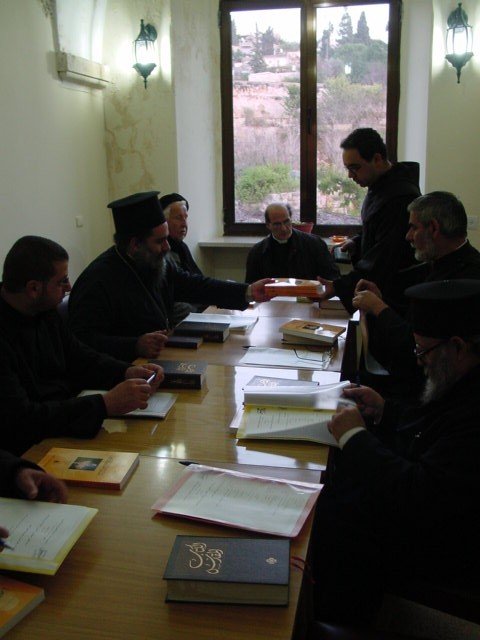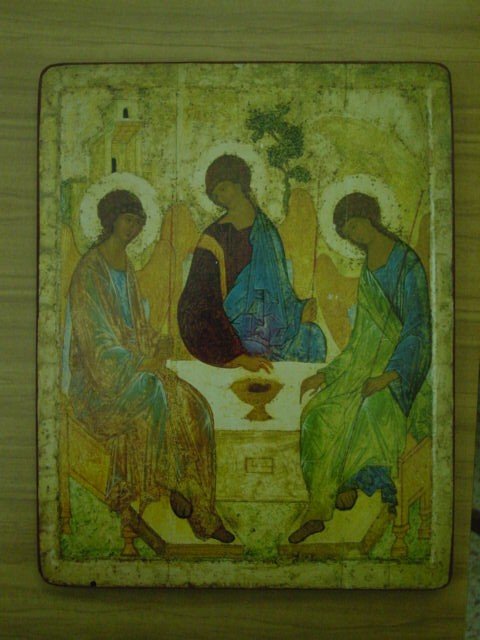November 25, 2002
Sunrise over Zababdeh
Elizabeth returned to school today, surprised to see the Jenin children arrive and a few of the Tubas teachers filter in. Unfortunately, the Tubas teachers who came did so by disobeying curfew, a risk well avoided by our Tubas students. However, school stayed open and we managed to fill the gaps one way or another. These absences are truly unfortunate as the semester winds down and everyone is intent on completing the curriculum in time for exams.
Before Elizabeth awoke, and early enough to catch a splendid sunrise, Marthame went down to Jerusalem with Fr. Thomas for a local clergy retreat sponsored by Sabeel Ecumenical Theological Center. Fr. Thomas, as a Palestinian Orthodox priest, has no permission to travel to Jerusalem (unlike Palestinian Catholics and Protestants alike who get special Vatican passports), so we were both a bit nervous about our success. We knew, however, that with time, determination, and money (accompanied by a foreign passport) there are ways to travel around roadblocks, and once inside the Old City, the chances of a silver-bearded Orthodox priest being asked for his ID are next to zero.
The first few checkpoints passed without incident, and the driver delivered us on the Palestinian side of the Ar-Ram checkpoint that divides Ramallah from Jerusalem. We began the walk towards the waiting taxis, hoping to simply walk past, but were flagged down by a soldier who spoke impeccable Arabic (Fr. Thomas speaks little English). "Hey! Baba! [Baba locally means Papa/Father and is also how Arabs may affectionately refer to the Pope] Where is your ID? Do you have permission?"
"No. I haven't been to Jerusalem in two years."
"Where are you going?"
"To my Patriarchate."
"How are you going to get there without permission?" He then left us, walking off to check another car, then turned back. "Go ahead, Baba. Say hi to Mama." Likely having an American with him helped.
Fr. Thomas prays at the Tomb of Christ - Jerusalem
We first went to the Church of the Holy Sepulchre, where Fr. Thomas kneeled prayed - no doubt in thanksgiving for safe travel, but also for the historic and powerful wonder of that place. For Orthodox in particular, place has particular meaning.
We then went to the Greek Orthodox Patriarchate, where the roles of the Ar-Ram checkpoint were reversed - the guards at the door were skeptical about Marthame until Fr. Thomas said, "He's with me."
Once inside, he dealt with overdue errands from two years of absence in Jerusalem - getting a Patriarchate ID (perhaps checkpoints will go easier now), checking on his salary and travel expenses situation, picking up calendars and pictures for the churches in Burqin, Zababdeh, and Tubas.
Each little clerical nook and cranny of the Patriarchate is a strange sight to behold - the priests, archimandrites, and bishops, all Greek nationals who speak a degree of Arabic, all held an air of history. One bishop with a splendid title (Bishop of Constantina) was responsible for IDs and appointments for the Patriarch. Another with a similarly wonderful prefix leaned over a lectern bending under the weight of notebooks (in Greek) detailing the reimbursements of parish priests. Another chain-smoked as he worked over a computer (history and technology meet in bizarre ways here).
We were hoping to find Bishop Timotheus, who was out, to discuss a project for Zababdeh. Next to the land purchased by the Zababdeh Housing Cooperative is land for sale that the Orthodox church wants to buy. For the price of three dunums, they are being offered eight. And if the funds are available, they will buy them. Historically, the purchase of Muslim land by Christians is unusual (the reverse, however, has been quite common), and Fr. Thomas is anxious to proceed.
Christian Clergy attending the Sabeel ecumenical retreat in Ein Kerem, Israel
We finally went up to Sabeel, arriving hours early for the retreat but in time for lunch. From there, we made our way with the other priests attending to the Franciscan Convent in Ein Kerem, the birthplace of John the Baptist. Like Jaffa near Tel Aviv, this picturesque Arab town was mostly emptied of its inhabitants in 1948, resettled by Jewish immigrants, and has since become something of an artists' colony. It is also the location of Hadassah Hospital, which is becoming familiar ground to us.
Rev. Naim Ateek, the Director of Sabeel, and Marthame made up the Protestant representation. There were also two Melkite priests (from Jerusalem and Nazareth parishes), two other Orthodox (both from Jerusalem), and three Roman Catholics (one from the Patriarchate, one some eighty-five years old and completely deaf, the other a twenty-seven year old Franciscan Monk hosting us at Ein Kerem). Marthame and Fr. Thomas, therefore, were the West Bank delegation.
Greek Orthodox Archimandrite Atallah Hanna and offer prayers to end the retreat day
Most striking among the group was Archimandrite Atallah (Jonathan) Hanna, an Arab Greek Orthodox priest from Israel who could easily have been a linebacker - six feet and then some, 300 pounds, striking green eyes, and a salt and pepper beard, he is an intimidating presence even before he opens his mouth. When he speaks, his Arabic is elegant - akin to someone speaking King James' English. He has also become infamous recently, given his arrest and questioning by the Israelis and his demotion by the Patriarchate. He has never shied away from controversy, nor from politics, but the accusations against him are bizarre - defending suicide bombings, links with terrorist organizations, etc. As much of a nationalist as he is, he's more proud of being a Christian - specifically an Orthodox Christian and as such vocally opposes violent acts of terrorism.
Andrei Rublev’s Holy Trinity icon grounded our conversation for ecumenical cooperation and interfaith dialogue
The retreat is entirely in Arabic, certainly a challenge (and something new) for Marthame, on the topic of Christian-Muslim dialogue. The facilitator opened with an icon of the Holy Trinity, using it as a point of departure for the conversations ahead. Since God's nature is plurality in unity, our Christian identity should be one of dialogue. We realized together that, if there is to be fruitful Christian-Muslim dialogue, there must first be fruitful Christian dialogue. This led to the subject of the ecumenical approach to feasts that is proliferating - in many places here Eastern and Western Christians have agreed on the dates for Christmas (on the Western calendar) and Easter (on the Eastern calendar). The Jerusalem clergy were fairly united in their distaste for this, particularly given that Patriarchs are now celebrating on different days than many of their parishes (Jerusalem and Bethlehem remain places where disunity reigns). For the West Bankers and those in the Galilee, though, the situation is far different. A minority community (in the northern West Bank, less than one percent) that can't agree on holy dates appears absurd to the majority. Marthame pointed out that there was historical precedence for compromise: in 1453, prior to the fall of Constantinople, the Roman and Greek Patriarchs of that city celebrated Mass together. This historic event was also the last time Christian prayer was heard in Hagia Sophia (the Church of Holy Wisdom) - it has been a mosque ever since. The point being two-fold: one, that this event which we see with great pleasure, was done not out of love, but out of fear; second, it was done too late - for the last thousand years, no Christian prayer has been allowed in that site. Obviously, as a Protestant, Marthame could be such the thorn - but the Melkites (Eastern Rite Catholics), were pleased by such words.
The evening concluded in prayer in the monastery's chapel, lifting up the school's absent Tubas students. The quiet of this place is a long way from Zababdeh's daily unpredictability.





